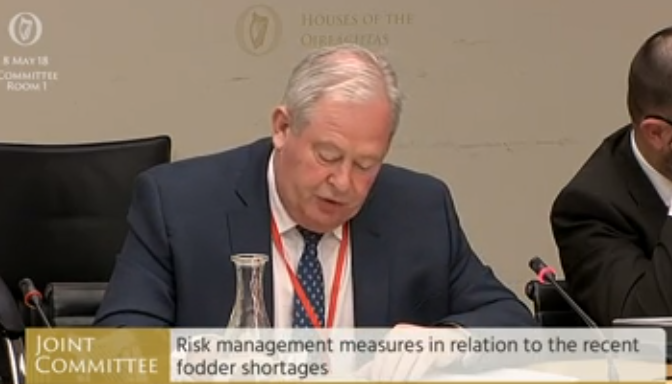ICOS addresses the Joint Oireachtas Committee on Agriculture on the Fodder Crisis
 ICOS President Martin Keane at the Joint Oireachtas Committee on Agriculture
ICOS President Martin Keane at the Joint Oireachtas Committee on Agriculture
On 8th May, ICOS President Martin Keane and CEO TJ Flanagan addressed the Joint Oireachtas Committee on Agriculture on the fodder crisis and the actions by co-operatives to support their members during a very challenging period.
Martin Keane informed the Oireachtas Committee that “Co-operative societies, both dairy and marts have imported approximately 18,000 tonnes of fodder. The fodder imported consisted mainly hay and haylage from the UK and further afield. In addition to the importation of fodder, ICOS members delivered the following for their members: Co-ops sourced and transported significant volumes of fodder within Ireland and Northern Ireland; Co-ops facilitated the transfer or matching up of fodder between their own suppliers; Co-op farm advisory teams worked intensively with farmers to identify fodder requirements, in order to develop appropriate feeding regimes in order to stretch fodder stocks; Co-ops made ruminant feed available at discounted prices, and kept prices low while ingredient costs rose substantially; Feed mills owned by co-ops operated at record levels. Critically, co-ops applied flexible and reasonable approaches towards credit throughout the crisis.”
He added “We recognise the support provided by Minister Michael Creed and the Department of Agriculture towards the cost of importing fodder. The contribution by the Department was necessary to reduce the significant costs involved in sourcing and transporting fodder from abroad. Despite the contribution by the Department, many of our members have borne a significant cost by importing fodder. It is critical that the entire allocation of €1.5 million promised by the Minister is made available to the co-op sector.”
Commenting on issues arising from the fodder crisis, Mr Keane noted that “In the immediate term, cash-flow on farms is a real and pressing concern. In Budget 2018, the Government committed to the delivery of a new low-cost loan measure for farmers. This must be introduced as quickly as possible.”
“In addition to cash-flow, there are also practical issues that have arisen due to the adverse weather on farms. These issues will impact on the ability of many farmers to conserve fodder for next year. ICOS calls for a detailed assessment of fodder needs to be carried out on farms after the harvest period to identify any shortfalls. There are several lessons that must be acknowledged by the industry and stakeholders including the adoption of more risk adverse strategies, such as carrying a greater fodder reserve from year to year. We must learn from this painful episode, to avoid a recurrence.”
Mr Keane concluded by remarking that “the fodder crisis and recent extreme weather events has showed the importance of the co-operative movement and its true value to farmers. I would like to pay tribute to co-op boards throughout the country, their senior management and the staff on the ground for the massive efforts they have made in dealing with the fodder crisis and extreme weather events. This clearly demonstrates the importance of the co-op movement to the farming community and the fabric of society in Rural Ireland.”
By Eamonn Farrell
Agri Food Policy Executive